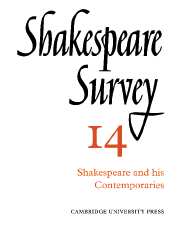Book contents
- Frontmatter
- Studies in Elizabethan and Jacobean Drama since 1900
- Shakespeare and Lyly
- Shakespeare and Mundy
- Marlowe as Provocative Agent in Shakespeare’s Early Plays
- The Tragedy of Revenge in Shakespeare and Webster
- The Simplicity of Thomas Heywood
- The Tragic Vision of Fulke Greville
- Shakespeare v. The Rest: The Old Controversy
- Shakespeare’s Gentleness
- Milton on Shakespeare
- An Unrecorded Elizabethan Performance of Titus Andronicus
- Stratford-upon-Avon a Hundred Years Ago
- International Notes
- Shakespeare Productions in the United Kingdom: 1959
- Three Directors: a Review of Recent Productions
- The Year's Contributions to Shakespearian Study 1 Critical Studies
- 2 Shakespeare’s Life, Times and Stage
- 3 Textual Studies
- Books Received
- Index
- Plate section
Three Directors: a Review of Recent Productions
Published online by Cambridge University Press: 28 March 2007
- Frontmatter
- Studies in Elizabethan and Jacobean Drama since 1900
- Shakespeare and Lyly
- Shakespeare and Mundy
- Marlowe as Provocative Agent in Shakespeare’s Early Plays
- The Tragedy of Revenge in Shakespeare and Webster
- The Simplicity of Thomas Heywood
- The Tragic Vision of Fulke Greville
- Shakespeare v. The Rest: The Old Controversy
- Shakespeare’s Gentleness
- Milton on Shakespeare
- An Unrecorded Elizabethan Performance of Titus Andronicus
- Stratford-upon-Avon a Hundred Years Ago
- International Notes
- Shakespeare Productions in the United Kingdom: 1959
- Three Directors: a Review of Recent Productions
- The Year's Contributions to Shakespearian Study 1 Critical Studies
- 2 Shakespeare’s Life, Times and Stage
- 3 Textual Studies
- Books Received
- Index
- Plate section
Summary
...And the production most remarkable: it only needed a few rehearsals by- Barker and myself to be perfect.
The task of a theatre director is so complicated that it is tempting to treat the matter as one of personal taste, as did Bernard Shaw writing to Mrs Patrick Campbell, to give 'no other but a woman's reason', but think it so because we think it so. And normal difficulties are increased when Shakespeare's plays are discussed, for everyone has different recollections of earlier productions and probably their own views on how to translate the plays into modern terms and adapt them for modern theatres. Yet while it is hard to formulate general rules, we may describe individual methods and compare them. The summer of 1960, for instance, showed the work of three directors of Shakespeare, each with clearly divergent training and abilities, and so by lining up their achievements it is possible to assess a wide range of currently accepted techniques.
Peter Hall had the fullest showing at the Memorial Theatre, Stratford-upon-Avon, with a Two Gentlemen of Verona, a Troilus and Cressida (in which he had the assistance of John Barton) and a revival of a Twelfth Night from two years earlier. This director came to Shakespeare after staging twentieth-century plays, and the experience is mirrored in his work. It is most obvious in his attitude to speaking Shakespeare's verse and prose: he is determined to avoid stuffiness, or solemn staginess, and seeks instead liveliness, humour and point—in a word, vitality. He has had an apron built over the orchestra pit and uses it for direct and forceful contact with the audience. The clear gains of this policy are in certain comic passages where the actors have sufficient skill to sustain the size of their delivery without crudeness. Patrick Wymark as Launce animated his repetitive speeches by a variety of timing and emphasis, and based all on a sympathetic understanding of the large-minded, stubborn character who is yet at the mercy of circumstance.
- Type
- Chapter
- Information
- Shakespeare Survey , pp. 129 - 137Publisher: Cambridge University PressPrint publication year: 1961
- 2
- Cited by

